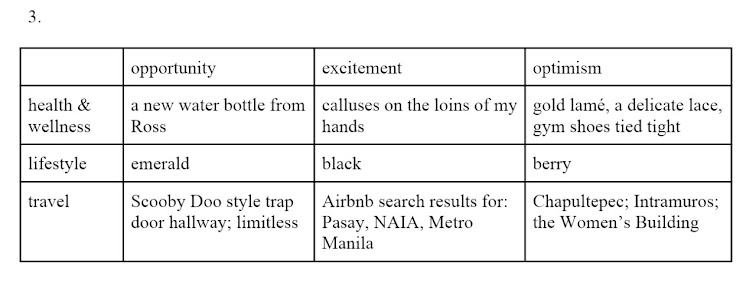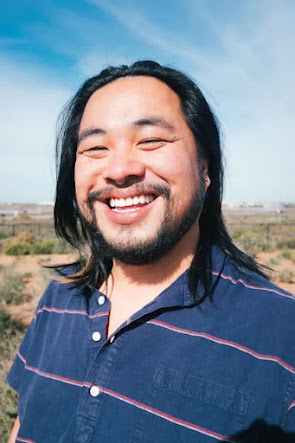I wrote my debut chapbook MY BOYFRIEND APOCALYPSE playfully. I turned to play as an alternative to utter despair. It felt, at times, like the only alternative. In the introduction to my chapbook, I write of its timeliness. I do not mean timeliness in the way, for example, the spectacle of daily catastrophes of white supremacy makes a think piece on the “antiracist” board of directors or a hashtag campaign to “decolonize” non-profits is timely, but timely in the sense that I had to write something to remind me of apocalypse’s ordinariness. I needed to convince myself again that the world has always already been ending, and even more urgently, I needed to have a laugh about it. Here, I reflect on my play in a particular poem in the chapbook.
The poem “A Student Asks Me about Empirical Knowledge of the Self as a Prerequisite for Self-Love (And I Fumble the Response)” originates from a writing workshop facilitated by Luna Petra, one of the student interns I am lucky to work with. Its title is a self-effacing admission. At the workshop, Luna offered the prompt, “What would it look like to really know yourself?” In our conversation after our quick write, we discussed how necessary such knowledge might be to the possibility of falling in love with ourselves. The students share their reflections and I come up blank. It is not within my job description to know everything but I feel it: I fumble it.
I wrote nothing that day. The resulting poem came with distance. With distance came the understanding that more importantly than whether or not I had an answer to Luna’s question and whether or not I knew everything (or anything), I knew then and now that I have the capacity to play, to disappear into imagined selves.
In the tasks offered in the first week of Julia Cameron’s The Artist’s Way (a twelve-week program-in-a-book to help recover from artistic blockages), the author prompts the reader-artist to dream of imaginary lives, asking her to write a list and imagine how she would live those lives. Cameron writes, “Look over your list and select one. Then do it this week.” So I pulled my jeans on as a professional football player last week and I walk to work as a scrapbooker this week. “The point of these lives,” Cameron writes, “is to have fun in them—more fun than you might be having in this one.” In that spirit, I wrote the language in the resulting poem to wear its best philosopher drag. There is a life I imagine leading as a theorist. I have as much fun as possible in that one, spending my days continuing to ponder how to do things with words, how to do nothing by writing in close proximity to jargon, and so the poem opens: “Subject always already…”
I play games with the language of philosophy as an invitation to myself: If I dress my musings on therapy, my tenuous self-concept, and mindfulness in the language of meaning and logic, I can grant myself the permission to refuse meaning and logic. Perhaps more accurately, I write in this language (pulled straight from my ten-year-old memory of an introductory rhetorical theory course) as an irreverent way to let myself relax my need to be meaningful and my need to be logical.
I want us—myself and my reader, composing poems in concert, across the distances from one another—to play with how meaning-making happens with words: What’s a poetic line without a sentence? What if the sentence was a table? What if the leftmost column is a list of magazine genres? What if the middle row is a list of the colors of artisanal poppers bottles?
When writing MY BOYFRIEND APOCALYPSE, I thought of play as care, as a way to hold myself through the moment and back to poetry. Years out from when these poems began, I can admit to playing maybe a bit too much. I can admit moments exist in the chapbook where I hedged my bets with ambiguity in a bid for self-protection, moments when play gave me an out from saying the thing. To that slightly younger poet I was, I offer an invitation: You don’t have to write a poem that you can’t bear to speak plainly. There is a poem you can and it may be right next to it.
And yet, the younger poet I was, in turn, offers: You can play all the little games you like. You can have some fun with this poem and the one right next to it. Lighten up, babe.
A
Student Asks Me about Empirical Knowledge of the Self as a Prerequisite to
Self-Love (and I Fumble the Response)
1.
Subject
always already falls
into
sea-deep powder sky. I imagine
my
mouth puckers. I would burst,
likely.
Subject always already arrives
here,
here, here. I wouldn’t check my notifications
as
often (always already notified). Here I dress
in
organza, here in silk, here in the tendons
swimming
chewy in spicy broth
of
cruelty. Across the universe
of
me: a horizon, an event called mother,
called
reunion. Or, kindness and reverie in concert,
tersely
skinned girl or cyborg or a library
of
the storied always already forgotten.
Falling
there will make me always already
generous
with walls of gold, soft touches through
toughest
chats, and custard rich kisses on the neck.
I
think my iPhone has made me better
practiced
at lying about what I know.
2.
What
I always already know: I am
not
lonely enough to chisel, desperate
enough
to turn my back.
My
therapist guides me in the work
of
sending presents to my brain stem
(a
universe suffering sugar, men,
and
a mediocre public transit system
for
an empty presence and a logic game).
He
says, “Breathe patience and generosity
into it” and I,
imagining an artichoke’s stalk
glitters from the
salt I’ve just sprinkled, meditate
on being less
shitty and mean to myself.
antmen pimentel mendoza (she, he) is the author of the chapbook MY BOYFRIEND APOCALYPSE (Nomadic Press, 2023). antmen is a writer, the Acting Co-Director of the Multicultural Community Center at UC Berkeley, and a student at the Rainier Writing Workshop at Pacific Lutheran University. His poetry is published or forthcoming in Underblong, Peach Mag, A Velvet Giant, and Split Lip. Find antmen online at @antmenismagic and antmenpm.com or riding her bike in Oakland, CA.
Maw Shein Win's most recent poetry collection is Storage Unit for the Spirit House (Omnidawn) which was nominated for the Northern California Book Award in Poetry, longlisted for the PEN America Open Book Award, and shortlisted for CALIBA's Golden Poppy Award for Poetry. Win's previous collections include Invisible Gifts (Manic D Press) and two chapbooks Ruins of a glittering palace (SPA) and Score and Bone (Nomadic Press). Win’s Process Note Series features poets and their process, She is the inaugural poet laureate of El Cerrito, CA and teaches poetry in the MFA Program at the University of San Francisco. Win often collaborates with visual artists, musicians, and other writers and was recently selected as a 2023 YBCA 100 Honoree. mawsheinwin.com





